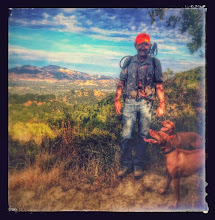 |
| The weather up in the hills was cold and damp. Visibility 50 feet. |
This morning's training for Bailey was based on a Cesar Milan show I watched last night. Cesar talked about how dog's senses should be emphasized and sight is the least important.
Dogs, like our Vizsla, use their senses much differently than we humans. In ranking of importance is:
- audio
- smell
- sight
Humans are more like:
- sight
- audio
- smell
So this morning at the crack of dawn, I took Bailey and Chloe out for some field training based on audio and smell.
We went up to the top of Briones Road and started our walk in the clouds on a moist and cold December morning. Bailey had his training collar on and I had the transmitter and my whistle around my neck.
One of the field trial traits that I need to break Bailey of is "yo-yoing" back to me. Judges are looking for hunting dogs that are hunting in a pattern most effective to find game (upland birds.) A dog running back to the hunter is wasting time and energy.
Bailey had learned, since he was young, as we walked off-leash to stay in touch with me. He would come back to me when he felt "nervous" that he had been gone too long.
I wanted him to check in regularly because their are dangers for a young dog in the "woods."
I wanted him to check in regularly because their are dangers for a young dog in the "woods."
In a field trial, this is wasted energy in the eyes of the judges.
An adult upland bird dog needs to have confidence. It is expected that the dog is out hunting ahead of his master and that the dog "knows" his master is behind him.
An adult upland bird dog needs to have confidence. It is expected that the dog is out hunting ahead of his master and that the dog "knows" his master is behind him.
So in fog that was so thick the most you could see was 50 feet ahead Bailey and Chloe ran through the open spaces. If Bailey chose to come back toward me unasked, two short toots on the whistle followed by a momentary tap on the training collar turned Bailey back "forward."
Over the 90-minute period that we walked up in the open hills, 80 percent of the time Bailey and Chloe were out of my "sight." I had to "trust" that Bailey and Chloe could use their other stronger senses to keep in touch with me, even if I couldn't see them.
it worked great! I keep calm as I "knew" they were around. We have walked hundreds, if not thousands of miles of hill trials over the last two years. I would never recommend this unless you have an extreme "bond" with your dogs and then they still might get lost.
I will continue to work all winter with Bailey to comfortably hunt ahead of me and he will know that I will be there behind him.
It is my responsibility to give three short toots on the whistle if I change directions so he can adjust his run to stay "in front."
Great times working with wonderful dogs. Have faith in your dogs. It isn't easy to trust their senses to know where we are.












1 comment:
Great idea Rod, I hope it works!
Post a Comment